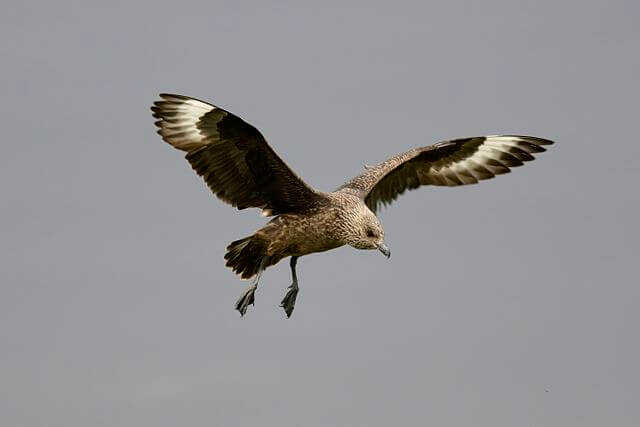
According to the RSPB, the population of the great skuas, known as the ‘pirates of the seas’ has plummeted due to avian flu.
These seabirds, renowned for their prowess in pilfering food from other birds along the UK’s coastlines, saw a staggering 76% decline in numbers in 2023, as reported by the charity.
The outbreak of avian flu in 2021-22 wreaked havoc on various bird species, including gannets and roseate terns, leading to significant population reductions. Prior to the outbreak, these species had been experiencing population growth.
The H5N1 strain of avian flu ravaged wild bird populations in summer 2021, resulting in mass fatalities.
The findings make it clear that avian flu is “one of the biggest immediate conservation threats faced by multiple sea-birds”, says the RSPB.
“This is a wake-up call as to how serious avian flu is and it’s coming on top of multiple other threats that these species face,” says Jean Duggan, RSPB avian influenza policy assistant.
A comprehensive survey conducted by the RSPB in May-July 2023 revealed the extent of the decline, attributing the decrease in great skuas, gannets, and roseate terns to avian flu, while noting probable reductions in sandwich and common tern populations.
Compared to a major census spanning 2015-2021, gannet populations were down by 25%, roseate terns by 21%, sandwich terns by 35%, and common terns by 42%.
The impact of avian flu was particularly severe in Scotland, home to almost the entire UK population of great skuas.
In 2022 alone, over 2,500 great skuas perished, with a significant portion from a single colony on Foula island, Shetland. The total UK population dwindled from 9,088 to 2,160.
The RSPB emphasises the critical role of Britain in global seabird conservation, as many species breed within its borders.
“It’s empowering to realise that if we take the right actions in the UK it will actually benefit global populations to a very significant degree,” Ms Duggan says.
Gannets were also badly affected in 2022, with 11,175 killed in Scotland and an estimated 5,000 mortalities at Grassholm in Wales.
In 2023, the total number counted in the UK had declined by 25%, going from 227,129 to 171,048.
Avian flu has become less acute in the UK in recent months, but it has caused mass mortalities of birds in other parts of the world.
In January it was detected in elephant and fur seals in Antarctica for the first time.
“While the virus is still present globally, UK birds are still at risk, and the virus will continue to mutate. We need to consider it a long-term threat,” says Ms Duggan.
In addition to avian flu, UK seabirds face threats from climate change, fishing-related mortality, offshore wind developments, and dwindling food resources.
While avian flu has abated in the UK in recent months, it continues to decimate bird populations worldwide. Notably, in January, the virus was detected in elephant and fur seals in Antarctica for the first time, underscoring its global reach and impact.
——————————————————————————
At Natural World Fund, we are passionate about stopping the decline in our wildlife.
The decline in our wildlife is shocking and frightening. Without much more support, many of the animals we know and love will continue in their decline towards extinction.
When you help to restore a patch of degraded land through rewilding to forests, meadows, or wetlands, you have a massive impact on the biodiversity at a local level. You give animals a home and food that they otherwise would not have had, and it has a positive snowball effect on the food chain.
We are convinced that this is much better for the UK than growing lots of fast-growing coniferous trees, solely to remove carbon, that don’t actually help our animals to thrive.
This is why we stand for restoring nature in the UK through responsible rewilding. For us, it is the right thing to do. Let’s do what’s right for nature!
Donate today at https://naturalworldfund.com/ and join in the solution!

